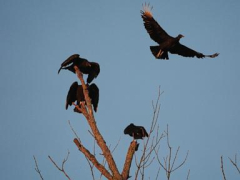EMINENCE, Ky. — Allan Bryant scans the sky as he watches over a minutes-old calf huddled under a tree line with its mother. After a few failed tries, the calf stands on wobbly legs for the first time, looking to nurse.
Above, a pair of birds circle in the distance. Bryant, hoping they’re not black vultures, is relieved to see they’re only turkey vultures — red-headed and not aggressive.
“Honestly, the black vulture is one of the ugliest things I’ve ever seen,” he said. “They’re easy to hate.”
Black vultures, scavengers that sometimes attack and kill sick or newborn animals, didn’t used to be a problem here. But now Bryant frequently sees the birds following a birth. He hasn’t lost a calf in several years, but they’ve killed his animals before. So now he takes measures to stop them.
In some of his fields, he erects a scarecrow of sorts — a dead black vulture — aimed at scaring off the birds. It’s a requirement of his depredation permit through the Kentucky Farm Bureau, which allows him to shoot a few birds a year. The dead bird keeps the live birds away for about a week, but they eventually come back, he said.
It’s a problem that may grow worse for cattle farmers as the scavenging birds’ range expands northward, in part due to climate change. Lobbying groups have been pushing for legislation that would allow landowners to kill more of these birds, which are protected but not endangered. But experts say more research is needed to better understand how the birds impact livestock and how their removal could affect ecosystems.
Black vultures used to mainly live in the southeastern U.S. and farther south in Latin and South America, but over the past century they’ve started to rapidly stretch northward and also west into the desert Southwest, said Andrew Farnsworth, a visiting scientist at Cornell Lab of Ornithology who studies bird migration.
Warmer winters on average, fueled by climate change, are making it easier for the birds to stay in places that used to be too cold for them. What’s more, the human footprint in suburban and rural areas is enriching their habitat: development means cars, and cars mean roadkill. Cattle farms can also offer a buffet of vulnerable animals for vultures that learn the seasonal calving schedule.
“If there’s one thing we’ve learned from a lot of different studies of birds, it’s that they are very good at taking advantage of food resources and remembering where those things are,” Farnsworth said.
Although black vultures are





